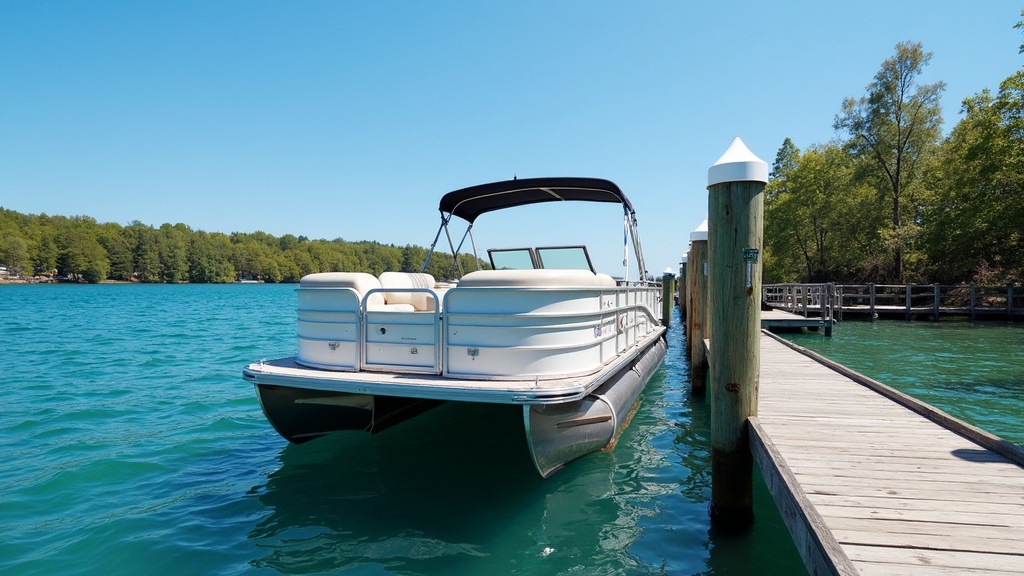Pontoon boats have easily become one of my favorite ways to spend time out on the water with friends and family.
The roomy layout, cushy seating, and overall adaptability make them a big hit for everything from low-key fishing trips to laid-back floating get-togethers.
But with so many models, price ranges, and brands on the market, buying a pontoon boat can get confusing really fast.
For first-timers, especially, making the right call can be tough since even a small mistake will stick with you every time you go boating. Knowing what to watch for will help you avoid unnecessary headaches, wasted cash, and years of regret.

**Here’s a little transparency: Our website contains affiliate links. This means if you click and make a purchase, we may receive a small commission. Don’t worry, there’s no extra cost to you. It’s a simple way you can support our mission to bring you quality pontoon boating content.
Pontoon Boat Buying Basics: Why Avoiding Mistakes Matters
A pontoon boat isn’t something most people purchase every weekend, so it’s important to choose wisely. Ending up with a boat that doesn’t suit your lifestyle, costs too much in repairs, or drains your wallet can turn boating into a burden. Doing your homework pays off by making sure your pontoon brings fun times and reliability for seasons to come.
While most folks focus on color, price, and length, there are a lot of little details that, if ignored, can blow up into big problems later. From frame and deck quality to insurance, budget, and brand reputation, thinking ahead goes a long way. That’s why I put together this guide to classic red flags and common mistakes-helping you avoid painful pitfalls and giving you the info you need for a smoother experience.
Many new buyers discover too late that they needed essential add-ons like a deep-V anchor kit or an extra-wide boarding ladder. These upgrades make a much bigger difference than people expect.
Common Mistakes to Avoid When Buying a Pontoon Boat
After spending years around pontoons, I’ve seen plenty of buyers end up with more headaches than happy memories. Here are some key slip-ups to steer clear of, whether you’re buying new or used:
- Choosing Sketchy Brands
Always check the manufacturer’s reputation before you pull out your wallet. A few minutes on boating forums or review sites can help you spot red flags, from weak construction to repeated recalls and sluggish customer support. When companies are fuzzy about technical specs or certifications, that’s a sign to walk away. Stick to established brands with a record of safety and reliability, and don’t hesitate to ask for proof if things seem fishy. - Buying the Wrong Size Pontoon
Getting a boat that’s too small, or way too large, is a surprisingly frequent error. Going too small often leaves you short on space for guests, fishing gear, or supplies. Buying too large means paying extra for gas, bigger engines, storage, and sometimes even needing a new tow vehicle. My rough guideline: under 22 feet for 4–6 guests and chill rides or smaller lakes, 24 feet and up if you entertain, have a big family, or love fishing. Watch out for sales pitches pushing add-ons you’ll never use (like fancy livewells or oversized tow pylons) unless they’ll truly fit your plans. - Overlooking Your Budget
All pontoons may look similar, but prices can balloon when you add engines, options, electronics, trailers, and routine upkeep. Nail down your budget and include must-have items like a decent outboard, safety gear, trailer, and insurance. I always tell folks that it’s smarter to go with a solid engine than blow cash on flashy lighting or extra cupholders that just add cost but no real value to your outings.
- Poor Storage Planning
I’ve seen people buy their dream pontoon, only to realize later their driveway, garage, or neighborhood just can’t handle that kind of boat. Before signing anything, research local storage yards, marinas, and talk to your HOA about parking rules. Pay attention to security, weather protection, and convenience-especially if you want your investment to last over years. - Settling for a Weak Warranty
Boat warranties can vary a lot, so read the print and don’t hesitate to ask the dealer exactly what’s covered, for how long, and how service works. Boats with vague, limited, or confusing warranty policies should get a hard pass. Go with coverage that includes big-ticket items like engines, structure, and upholstery for at least a couple seasons. Good warranties save huge money and headaches if you ever need a repair. - Avoid Boats With Unsafe or Narrow Boarding Ladders
One detail that often gets overlooked during the buying process is the boarding ladder – and it’s a mistake many families end up regretting. Standard pontoon ladders are frequently narrow, steep, and awkward to use, especially for kids, older adults, or anyone climbing back aboard after swimming. - A stable ladder should feel secure underfoot, provide enough width for balance, and allow swimmers to exit the water without struggling or slipping. If a pontoon comes equipped with a flimsy or shallow ladder, upgrading it is one of the simplest ways to improve overall safety and enjoyment on the water.
- Many experienced owners prefer extra-wide, multi-step ladders because they offer:
- Wider steps for better balance
- Non-slip surfaces for wet feet
- Easier entry and exit for children and seniors
- A more confident feel when boarding from deeper water
- If you plan to swim regularly or boat with family members of different ages, this is one upgrade worth considering early rather than after an uncomfortable first outing.
See an example of a well-rated extra-wide pontoon boarding ladder here.
Common Pontoon Buying Mistakes & Gear Fixes
| Mistake to Avoid | Why It’s a Problem | Recommended Fix | Helpful Add-On |
|---|---|---|---|
| Not enough storage | Deck becomes cluttered | Soft cooler | Compare options |
| No docking protection | Rails get scratched | No-drill fenders | View on Amazon » |
| Insufficient shade | Kids get overheated | Clip-on canopy | See details |
Smart Steps: Making Sure the Boat Fits Your Needs
The right pontoon for you should fit your plans, water types, and group size-not just your budget or what’s on sale. Here are a few highly useful things to consider before locking in your decision:
- New vs. Used Pontoon Boats
New boats provide the latest tech, zero wear and tear, and a fresh-out-the-factory feel, but they carry a bigger price tag and lose value fastest. Used pontoons can be bargains, but look over them closely—a marine mechanic or surveyor will help you check the frame, leaks, pontoon tubes, and engine for signs of abuse or neglect. Full service histories go a long way in proving a boat was treated right and can boost your confidence in a used buy. - Flooring Types: Carpet vs. Vinyl vs. Alternatives
– Carpet: Cozy and cost-effective but soaks up water, causing mildew and bad smells if not dried.
– Vinyl: Much more popular lately-it stands up to water, wipes clean, and lasts for years with minimal care. It can feel hot to bare feet on sunny days.
– Specialty flooring (woven mat, EVA foam): Top-dollar choice with the softest feel and easiest cleaning, great if you want the ultimate in comfort and looks.
Also, make sure to get seating layouts and storage space that fit your hobbies. Anglers may want roomy casting decks and rod holders, while party fans value more lounges, tables, and maybe a built-in cooler or two.
Hidden Problems and Inspection Tips

Looks can be deceiving. Whether it’s new or used, a quick walkaround isn’t enough to prove you’ve found a winner. Here are some pointers I always follow for a more thorough inspection:
- Poke under every seat and storage hatch for stains, mold, or soft spots in the deck.
- Check the pontoon tubes for big dents, cracks, or patch marks.
- Flip switches and test all installed gear-lights, shifters, steering, horns, and livewells.
- Take it out on the water if possible; listen for weird engine noises or steering issues.
- Look at the engine cowling and prop for damage; ask to see maintenance log
Peek in the bilge (if accessible) for rust, odd smells, or oil leaks-early trouble signs.
Checking these things doesn’t just keep you safe; it helps you avoid surprise repair bills that can sour your whole boating adventure.
Insurance, Registration and Ongoing Costs
The sticker price is just the start. Get an insurance quote before buying so you won’t be blindsided by premiums. While some locales don’t force you to insure the boat, it’s a smart move given high repair costs and accident risks. Registration and taxes are extra and can run several hundred dollars, depending on your area and boat size.
Maintenance also adds up: from spring tune-ups and oil changes to cleaning, winterizing, and the inevitable repairs from normal wear and tear, these yearly tasks keep your pontoon looking sharp and running well. Plan a little extra in your budget for things like replacing life jackets, cleaning supplies, and the occasional professional detail job or storage upgrade. These ongoing expenses keep your investment fun and reliable for years to come.
Busting Pontoon Boat Myths
I’ve heard so many myths about pontoons-from “they all handle the same” to “fancy upgrades are a rip-off.” In reality, big differences in hull design, tube diameter, and outboard muscle can mean smoother travels, more stability, and much more fun for everyone on board. Never assume a budget model will ride or last like a luxury cruiser. If you can, test-drive a few different types and talk to other owners for their real-world thoughts. Popular forums, dealers, or BoatUS (BoatUS Expert Advice) have plenty of advice. Your boating style matters for anchor setup, sound system choices, and layout—don’t just buy what’s cheapest or flashiest if it won’t work for you.
Choosing the Right Engine for Your Pontoon
This is a huge factor in feeling good about your boat every time you leave the dock. Underpowered pontoons can barely keep up with a full load, and trying to enjoy water sports or cruise in rough water will just lead to frustration. But oversized engines waste fuel and will beat down your budget on repairs and maintenance. For the best experience, let your usual group size and favorite activities-like tubing, laid-back fishing, or chill daytime cruises-guide your horsepower choice. I suggest choosing brands with service centers near your regular boating lake, so help is at hand if something ever acts up.
One extra tip for families: consider motors with modern fuel injections-start easy even for beginners and run cleaner, saving you trouble over the long haul.
Frequently Asked Questions About Buying a Pontoon Boat
Pontoon shopping triggers plenty of questions, especially from first-time buyers. Here’s what most people ask, along with the pointers I offer:
Q: What do families regret not buying early?
A: Shade accessories, safety ladders, and a floating phone case.
Q: What accessories should every pontoon buyer plan to purchase?
A: A deep-V anchor, fender kit, and soft cooler are essential.
Q: How do I know if a pontoon has enough storage?
A: If under-seat storage is limited, add a soft-sided cooler or floating dry bag.
Q: What’s the best time of year to buy a pontoon boat?
A: Shopping in late fall or winter can sometimes bring lower prices, but you may need to wait until spring for delivery and launch. Many manufacturers, though, offer decent specials at boat shows, so check your region’s events too.
Q: Is it worth going for luxury features like upgraded sound or lighting systems?
A: If you’ll use them often, absolutely. Stereo upgrades, underwater lights, or bigger sun pads can really make your outings special. But if features are just for show, you might be better off investing in a more reliable engine or extended warranty coverage.
Pro Tips for Getting the Most Out of Your Pontoon Boat Purchase

Go slow. Research everything-brands, models, dealers, and options before making that final call. Draft a list of must-have features, like seating layout or fishing add-ons, and another for nice-to-have bonuses like USB chargers or premium lights. Only look at models that line up with your main priorities to avoid getting distracted by extras you’ll never use.
Don’t be shy about talking to current pontoon owners at your local lake or marina. Their first-hand advice will give you real insight that brochures just can’t match. Visit dealer showrooms, read reviews, and check out YouTube tours or walkarounds for more perspective. Finally, remember that keeping your pontoon clean, covered, and on a good maintenance schedule pays off big time if you ever decide to upgrade or sell.
Bottom line: if you take your time, keep your priorities in mind, and sidestep these classic mistakes, your new pontoon boat will set you up for countless summer memories filled with sun, relaxation, and laughter. Choose wisely-from reputable brands, with solid warranties, tailored features, and honest dealers-and your boat will bring smiles every time you hit the water. Happy boating!
Buyer Checklist: Must-Have Gear for New Pontoon Owners
Before your first full season on the water, it’s smart to make sure your pontoon is equipped with a few essentials that improve safety, comfort, and overall enjoyment. Not every item needs to be purchased on day one, but having a plan helps you avoid last-minute scrambles or disappointing first outings.
Safety & Boarding Essentials
These items make a big difference for families, swimmers, and guests of all ages.
Extra-Wide Boarding Ladder
Improves stability when entering or exiting the water and is far safer than narrow factory ladders – especially for kids and older passengers.
Check current options
Deep-V Anchor Kit
Helps prevent drifting in wind or current and makes swimming stops far more relaxing.
See available anchor kits
Floating Waterproof Phone Case
Protects your phone from drops, splashes, and unexpected swims — a small item that saves big headaches.
View examples
Docking & Boat Protection
Protecting your pontoon from scratches and wear keeps it looking new and helps preserve resale value.
No-Drill Fender Set
Shields rails and panels during docking without permanent hardware or complicated installation.
Compare fender styles
Floating Dry Bag
Keeps keys, electronics, and spare clothes safe and dry while onboard or swimming.
See size options
Comfort & Convenience Upgrades
These upgrades aren’t mandatory, but they dramatically improve longer outings and family trips.
Soft-Sided Under-Seat Cooler
Adds cold storage without taking up deck space and helps reduce clutter.
Browse cooler options
Clip-On Shade Canopy
Essential for kids, pets, and long summer days when full sun becomes uncomfortable.
View shade solutions
Fun & Family Extras (Optional)
Nice-to-have items if tubing, entertaining, or hosting guests is part of your plan.
Pontoon-Rated Tow Rope
Designed for the weight and pull of pontoons when tubing or towing inflatables.
See tow rope specs
Final Tip
You don’t need to buy everything at once. Start with safety and boarding upgrades, then add comfort and fun items as you learn how you actually use your pontoon. Thoughtful upgrades often deliver more enjoyment than flashy factory add-ons – and can be added on your timeline.
